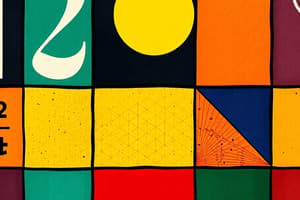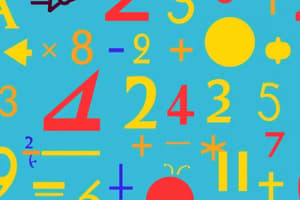Podcast
Questions and Answers
Which of the following is considered the most elementary branch of mathematics?
Which of the following is considered the most elementary branch of mathematics?
- Calculus
- Geometry
- Algebra
- Arithmetic (correct)
What does algebra primarily use to represent numbers and quantities?
What does algebra primarily use to represent numbers and quantities?
- Calculus
- Geometric Shapes
- Statistical Data
- Symbols (correct)
Which branch of mathematics focuses on the properties of points, lines, and surfaces?
Which branch of mathematics focuses on the properties of points, lines, and surfaces?
- Geometry (correct)
- Calculus
- Algebra
- Trigonometry
What is the primary focus of trigonometry?
What is the primary focus of trigonometry?
Which two main branches comprise calculus?
Which two main branches comprise calculus?
What is the focus of descriptive statistics?
What is the focus of descriptive statistics?
Which field of mathematics applies formal logic?
Which field of mathematics applies formal logic?
What area does number theory primarily explore?
What area does number theory primarily explore?
Which of the following is a key area within discrete mathematics?
Which of the following is a key area within discrete mathematics?
What does mathematical analysis study?
What does mathematical analysis study?
Flashcards
What is Mathematics?
What is Mathematics?
The abstract science of number, quantity, and space.
What is Arithmetic?
What is Arithmetic?
The oldest and most elementary branch of mathematics that deals with basic operations on numbers.
What is Algebra?
What is Algebra?
A branch of mathematics that generalizes arithmetic by using symbols to represent numbers and quantities.
What is Geometry?
What is Geometry?
Signup and view all the flashcards
What is Trigonometry?
What is Trigonometry?
Signup and view all the flashcards
What is Calculus?
What is Calculus?
Signup and view all the flashcards
What is Statistics?
What is Statistics?
Signup and view all the flashcards
What is Logic?
What is Logic?
Signup and view all the flashcards
What is Number Theory?
What is Number Theory?
Signup and view all the flashcards
What is Discrete Mathematics?
What is Discrete Mathematics?
Signup and view all the flashcards
Study Notes
- Mathematics is the abstract science of number, quantity, and space
- Math studies topics such as quantity (number theory), structure (algebra), space (geometry), and change (mathematical analysis)
- It has no generally accepted definition
Arithmetic
- Arithmetic is the oldest and most elementary branch of mathematics
- It deals with basic operations on numbers
- Basic operations include addition, subtraction, multiplication, and division
- These operations are performed on real numbers, complex numbers, and integers
- Arithmetic is the foundation for more advanced mathematics, such as algebra
Algebra
- Algebra is a branch of mathematics that generalizes arithmetic
- It uses symbols (usually letters) to represent numbers and quantities
- Algebraic expressions are formed by combining these symbols with arithmetic operations
- Algebra is used to solve equations and inequalities
- Elementary algebra deals with solving simple equations involving one or more variables
- Abstract algebra studies algebraic structures such as groups, rings, and fields
Geometry
- Geometry is a branch of mathematics concerned with the properties and relations of points, lines, surfaces, solids, and higher dimensional analogs
- Euclidean geometry is the study of plane and solid figures based on a set of axioms and postulates
- Analytic geometry uses algebraic techniques to study geometric problems
- Differential geometry uses calculus to study the properties of curves and surfaces
- Topology studies the properties of geometric objects that are preserved under continuous deformations
Trigonometry
- Trigonometry is a branch of mathematics that studies the relationships between the sides and angles of triangles
- It is based on trigonometric functions such as sine, cosine, and tangent
- Trigonometry is used in surveying, navigation, and engineering
- Trigonometric identities are equations that are true for all values of the variables
Calculus
- Calculus is a branch of mathematics that deals with continuous change
- It has two main branches: differential calculus and integral calculus
- Differential calculus deals with the rate of change of functions (derivatives)
- Integral calculus deals with the accumulation of quantities (integrals)
- Calculus is used in physics, engineering, economics, and other fields
Statistics
- Statistics is the science of collecting, analyzing, interpreting, and presenting data
- Descriptive statistics involves summarizing and describing the main features of a dataset
- Inferential statistics involves using sample data to make inferences about a population
- Probability theory provides a mathematical framework for understanding randomness and uncertainty
- Statistical methods are used in many fields, including science, business, and government
Logic
- Logic is the study of reasoning
- Mathematical logic is concerned with the application of formal logic to mathematics
- Propositional logic deals with the logical relationships between statements
- Predicate logic extends propositional logic by introducing quantifiers and predicates
- Set theory is a branch of mathematical logic that studies sets, which are collections of objects
Number Theory
- Number theory is a branch of mathematics concerned with the properties of integers
- It deals with prime numbers, divisibility, and congruences
- Important topics include Fermat's Last Theorem and the Riemann Hypothesis
- Cryptography relies on number theory for secure communication
Discrete Mathematics
- Discrete mathematics is a branch of mathematics that deals with discrete objects
- It includes topics such as graph theory, combinatorics, and logic
- Graph theory studies the properties of graphs, which are mathematical structures used to model relationships between objects
- Combinatorics deals with counting and arranging objects
- Discrete mathematics is used in computer science, operations research, and engineering
Mathematical Analysis
- Mathematical analysis is a branch of mathematics that studies the concepts of limit, continuity, differentiation, and integration
- Real analysis studies the real numbers, sequences, and functions of real variables
- Complex analysis studies complex numbers and functions of complex variables
- Functional analysis studies vector spaces and operators
Applied Mathematics
- Applied mathematics involves the application of mathematical methods to solve problems in other fields
- Numerical analysis develops algorithms for solving mathematical problems on computers
- Optimization deals with finding the best solution to a problem
- Mathematical modeling involves creating mathematical representations of real-world phenomena
Studying That Suits You
Use AI to generate personalized quizzes and flashcards to suit your learning preferences.




